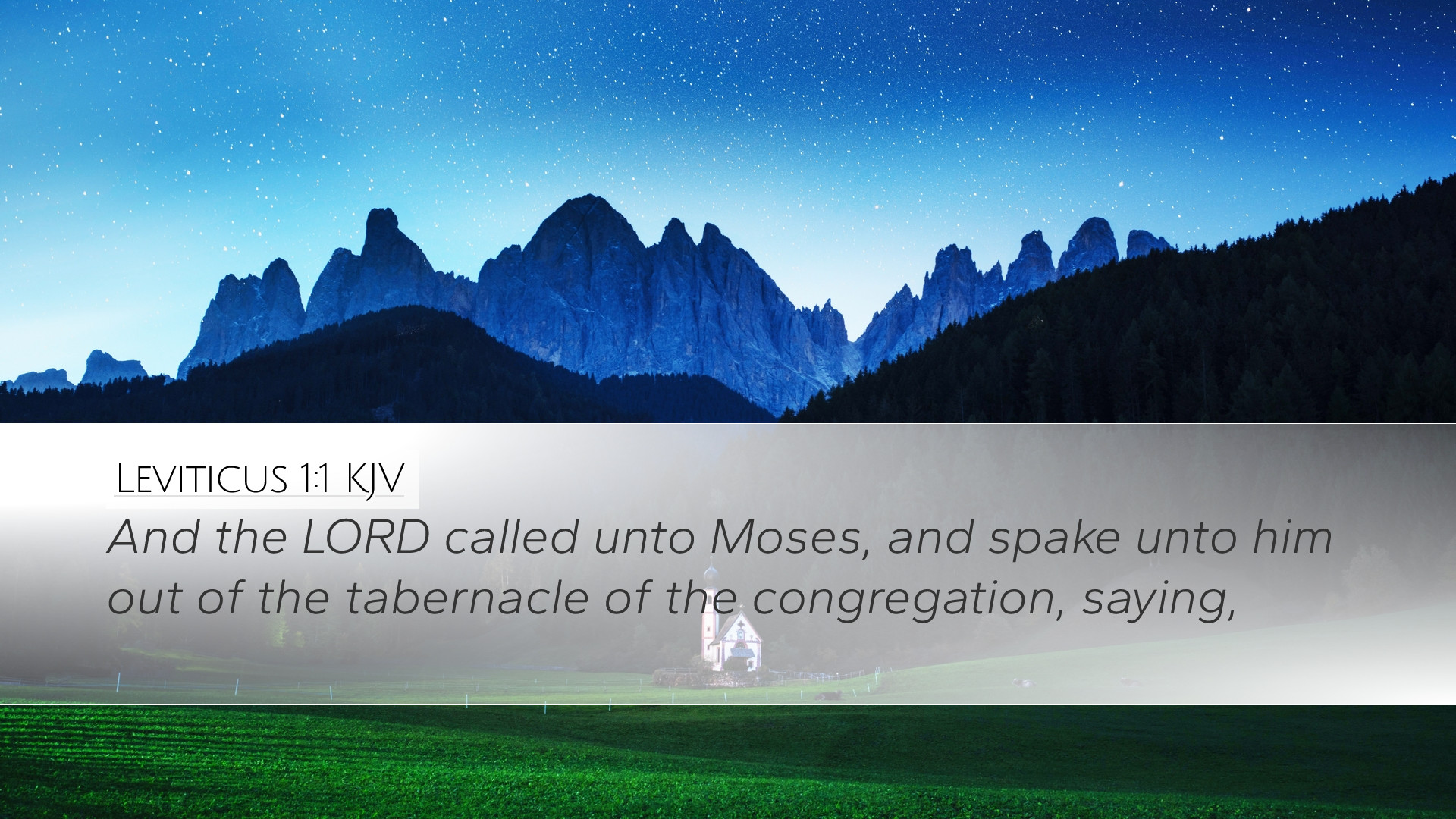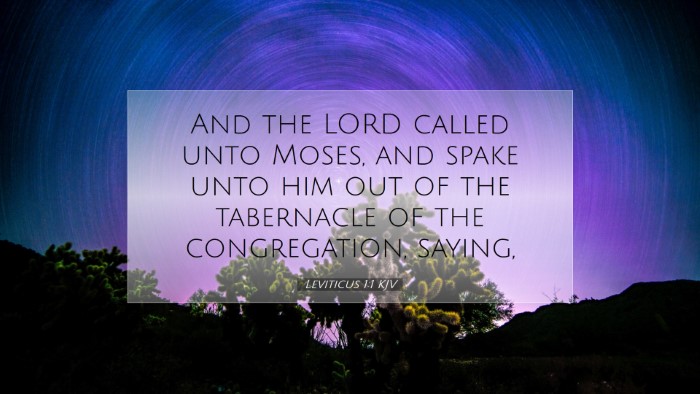Commentary on Leviticus 1:1
Introduction
The book of Leviticus stands as a pivotal component of the Pentateuch, offering profound insights into the nature of holiness, worship, and sacrifice. Leviticus 1:1 serves as an introduction to the laws and regulations concerning sacrifices, a crucial element in the covenant relationship between God and Israel.
Verse: Leviticus 1:1
"And the LORD called unto Moses, and spake unto him out of the tabernacle of the congregation, saying,"
Exegesis and Analysis
Divine Initiation
According to Matthew Henry, the notion that "the LORD called unto Moses" emphasizes God's sovereignty in the communication with humanity. This divine initiation underscores the relationship between God and Moses, indicating that true knowledge and understanding come from God. It highlights that it is God who directs worship and the means by which it is conducted.
The Significance of the Tabernacle
Albert Barnes elaborates on the physical setting of this divine communication. The "tabernacle of the congregation" represents the dwelling place of God among His people. The tabernacle is a significant symbol of God's presence, signifying His desire to dwell amidst His people. This location becomes the focal point of worship and communion.
The Importance of Listening
Adam Clarke notes that Moses’ role as a mediator and prophet is essential. God speaks from the tabernacle, and Moses is expected to listen and relay this holy instruction to the Israelites. Clarke emphasizes the importance of heeding God's voice and the implications of ignoring divine directives. This serves as a reflection for spiritual leaders and believers on the necessity of discernment and obedience to God's calling.
Contextual Understanding
Considering the context, the initial verses of Leviticus follow the dedicatory events surrounding the tabernacle. The people of Israel are at a pivotal moment following their exodus from Egypt. The establishment of sacrificial laws provides a framework for maintaining a relationship with God, allowing for atonement and communion with the Holy One.
Theological Themes
Holiness and Sacrifice
The concept of holiness is ever-present in Leviticus. The call to sacrifice serves to remind the Israelites of their covenant responsibilities and the seriousness of sin. Matthew Henry outlines how the sacrifices outlined in Leviticus serve not only as atonement for sin but also as expressions of worship, gratitude, and fellowship with God.
God's Desire for Relationship
Barnes notes that God's communication with Moses signifies His desire to maintain a personal relationship with His people. The act of speaking from the tabernacle reflects God's accessibility, highlighting the relational aspect of worship — not merely a set of rituals but a heartfelt engagement with the divine.
Obedience as Worship
Clarke emphasizes that these instructions to Moses and the subsequent sacrifices demonstrate that true worship is rooted in obedience to God's commands. It parallels New Testament themes where Paul speaks of presenting oneself as a living sacrifice (Romans 12:1). Hence, the call to worship in Leviticus is echoed in the Christian tradition, reinforcing the continuity of God's call to holiness and obedience.
Practical Applications
Listening to God's Call
For pastors and leaders, Leviticus 1:1 serves as a reminder of the importance of listening to God's voice. In an age filled with distractions, the call of God persists. Believers are encouraged to cultivate a posture of listening and prayerful discernment, seeking clarity on God’s will.
Understanding the Nature of Worship
The act of sacrifice in Leviticus reflects diverse aspects of worship — acknowledgment of sin, gratitude for God's provisions, and the desire for fellowship. Students and scholars of theology can delve into the implications of these sacrifices for understanding modern worship practices, recognizing the balance between ritual and genuine heartfelt service to God.
Emphasizing Holiness
The call to holiness resonates throughout scripture. This passage invites believers to reflect on their own lives in light of God's standards for holiness. The principles found here may provoke critical self-examination and a renewed commitment to spiritual integrity within the church community.
Conclusion
Leviticus 1:1 encapsulates profound theological insights that transcend time and culture. It highlights the nature of divine communication, the significance of worship, and the enduring call for holiness. By understanding the weight of this verse, pastors, students, theologians, and scholars can appreciate the richness of the scriptures and their application in contemporary ministry and personal faith.


